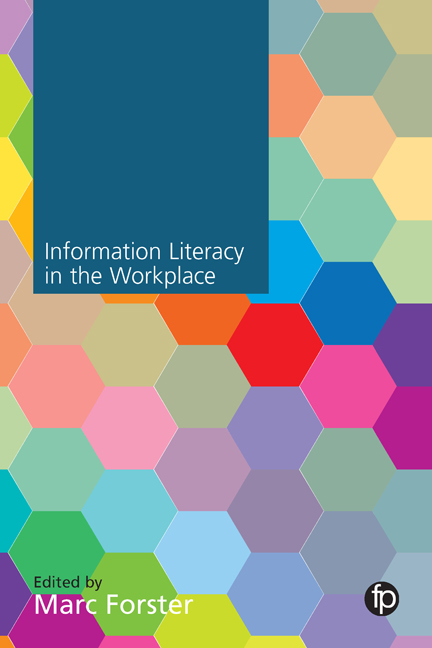Book contents
- Frontmatter
- Contents
- Figures and tables
- Contributors
- Foreword
- 1 Information Literacy and the workplace: new concepts, new perspectives?
- 2 How is Information Literacy experienced in the workplace?
- 3 Information Literacy and the personal dimension: team players, empowered clients and career development
- 4 From transaction to transformation: organizational learning and knowledge creation experience within Informed Systems
- 5 Virtuality at work: an enabler of professional Information Literacy
- 6 Determining the value of Information Literacy for employers
- 7 Information Literacy's role in workplace competence, ‘best practice’ and the ethics of professional obligation
- 8 Learning within for beyond: exploring a workplace Information Literacy design
- 9 Developing information professional competences in disciplinary domains: a challenge for higher education
- 10 The ‘hidden’ value of Information Literacy in the workplace context: how to unlock and create value
- 11 The ‘Workplace Experience Framework’ and evidence-based Information Literacy education
- References
- Index
11 - The ‘Workplace Experience Framework’ and evidence-based Information Literacy education
Published online by Cambridge University Press: 08 June 2018
- Frontmatter
- Contents
- Figures and tables
- Contributors
- Foreword
- 1 Information Literacy and the workplace: new concepts, new perspectives?
- 2 How is Information Literacy experienced in the workplace?
- 3 Information Literacy and the personal dimension: team players, empowered clients and career development
- 4 From transaction to transformation: organizational learning and knowledge creation experience within Informed Systems
- 5 Virtuality at work: an enabler of professional Information Literacy
- 6 Determining the value of Information Literacy for employers
- 7 Information Literacy's role in workplace competence, ‘best practice’ and the ethics of professional obligation
- 8 Learning within for beyond: exploring a workplace Information Literacy design
- 9 Developing information professional competences in disciplinary domains: a challenge for higher education
- 10 The ‘hidden’ value of Information Literacy in the workplace context: how to unlock and create value
- 11 The ‘Workplace Experience Framework’ and evidence-based Information Literacy education
- References
- Index
Summary
This chapter will discuss:
• a new approach to IL education for students and professionals based on detailed research into its experience in the workplace.
• how the ‘relational’ approach to IL education has, through research methods which yield exceptional detail, made possible the ‘Workplace Experience Framework’. This is a guide to the structure, content and method of an evidence-based IL educational intervention, based on the range of themes and complexities of experience of IL in a workplace or profession.
• how that detail of experience can be applied to formulate a new means of monitoring an individual's IL development.
Please note: It is strongly advised that you read Chapter 2 before reading this chapter, as many of the research findings and ideas used below are introduced there and often discussed in more detail.
Introduction
In order that a professional can begin a career in the workplace using information effectively, in the context of the knowledge development and learning required for individual, team and organizational functionality, part of professional education should involve IL education of the kind appropriate for that workplace. In Chapter 8, page 111, Annemaree Lloyd suggests that students’ IL development requires a transition from an academic or ‘preparatory’ setting to a workplace one:
Librarians are placed in unique positions to mediate the educational and discipline/workplace landscapes in order to identify knowledge, competencies and skills that students will require while studying and when in transition to the workplace.
This chapter attempts to show one way in which workplace IL education might be based on detailed experiences of IL in the workplace, so that students are inducted into information experiences relevant to their work culture or profession. The chapter may be of particular interest to librarians attempting to develop IL in professional workers, and academics keen to develop in their students the skills that new professionals need in order to function effectively and ethically in the workplace.
In what ways has the development of IL traditionally been encouraged? Historically, the literature describes attempts to develop what are felt to be relevant skills and knowledge, based on behaviourist or constructivist approaches (Brettle, 2003 and 2007; Elrod, Wallace and Sirigos, 2012).
- Type
- Chapter
- Information
- Information Literacy in the Workplace , pp. 149 - 164Publisher: FacetPrint publication year: 2017

